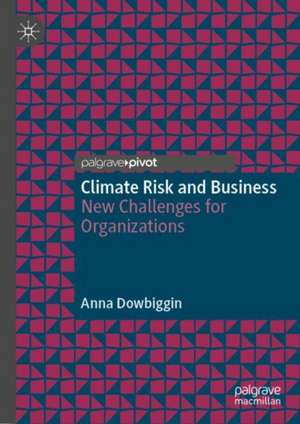Climate Risk and Business: New Challenges for Organizations
Autor Anna Dowbigginen Limba Engleză Hardback – 26 oct 2021
Though much has already been written on corporate sustainability efforts, there is a greater need now for building mitigative capacity at the firm level, in alignment with shifting policy and regulatory regimes. Theoretical and empirical work on these areas is addressed in the novel thought experiment approach of this book. A research agenda for future work is provided.
Preț: 451.10 lei
Nou
Puncte Express: 677
Preț estimativ în valută:
86.32€ • 94.06$ • 72.74£
86.32€ • 94.06$ • 72.74£
Carte tipărită la comandă
Livrare economică 23 aprilie-07 mai
Preluare comenzi: 021 569.72.76
Specificații
ISBN-13: 9783030782436
ISBN-10: 3030782433
Pagini: 215
Ilustrații: XV, 120 p. 5 illus.
Dimensiuni: 148 x 210 mm
Greutate: 0.34 kg
Ediția:1st ed. 2021
Editura: Springer International Publishing
Colecția Palgrave Macmillan
Locul publicării:Cham, Switzerland
ISBN-10: 3030782433
Pagini: 215
Ilustrații: XV, 120 p. 5 illus.
Dimensiuni: 148 x 210 mm
Greutate: 0.34 kg
Ediția:1st ed. 2021
Editura: Springer International Publishing
Colecția Palgrave Macmillan
Locul publicării:Cham, Switzerland
Cuprins
CHAPTER 1: Climate Risk: The Challenges of Climate Change on the Organization.- CHAPTER 2: Climate Risk and Organizational Change.- CHAPTER 3 Management Subjectivity in Climate Risk Decision-making.- CHAPTER 4 Inoculating Subjectivity out of Climate Decision-making.- CHAPTER 5 Climate Risk Disclosures – Corporate narratives and storytelling.- CHAPTER SIX Scenario Planning and Imaging Future States.
Notă biografică
Dr. Anna Dowbiggin is a Professor in the School of Business at the University of Guelph-Humber, Canada.
Textul de pe ultima copertă
“The risks that climate change has created – and will continue to create – are appearing on multiple fronts in business. Climate risk is no longer just about extreme weather events but about a spectrum of systemic risk impacts on business – and no business is immune. Dowbiggin’s unique approach in Climate Risk and Business takes a much-needed risk-based view of how risk mitigation through decarbonization will transform business organizations in unprecedented ways. I applaud Dowbiggin’s foresight and approach to a very timely and important topic.”
—Blair Feltmate, Head, Intact Centre on Climate Adaptation, Faculty of Environment, University of Waterloo, Canada
“The risks posed by climate change are becoming increasingly evident with the continuous flow of extreme weather events hitting people and businesses across the world. This important book is among the first to provide an in-depth look into the nature of climate risk for business and exploresthe various strategies for its mitigation. It critically examines how business will have to change and adapt to become more resilient to the physical and societal impacts of climate change. Dowbiggin’s book forms essential reading to get up to speed with this very important topic”.—Jonatan Pinkse, Professor &, Executive Director, Manchester Institute of Innovation Research, Alliance Manchester Business School, University of Manchester, UK
Addressing the urgency of radical decarbonization as a mitigative response to climate risk, this book explores how business can respond to the challenges of climate risk, through various transformational processes. Those processes involve cognitive transformations, organizational changes, climate risk integration into risk management practices, shifts in corporate reporting and disclosure as well as futuristic scenario-based planning beyond normal business planning cycles.
Though much hasalready been written on corporate sustainability efforts, there is a greater need now for building mitigative capacity at the firm level, in alignment with shifting policy and regulatory regimes. Theoretical and empirical work on these areas is addressed in the novel thought experiment approach of this book. A research agenda for future work is provided.
Dr. Anna Dowbiggin is a Professor in the School of Business at the University of Guelph-Humber, Canada.
—Blair Feltmate, Head, Intact Centre on Climate Adaptation, Faculty of Environment, University of Waterloo, Canada
“The risks posed by climate change are becoming increasingly evident with the continuous flow of extreme weather events hitting people and businesses across the world. This important book is among the first to provide an in-depth look into the nature of climate risk for business and exploresthe various strategies for its mitigation. It critically examines how business will have to change and adapt to become more resilient to the physical and societal impacts of climate change. Dowbiggin’s book forms essential reading to get up to speed with this very important topic”.—Jonatan Pinkse, Professor &, Executive Director, Manchester Institute of Innovation Research, Alliance Manchester Business School, University of Manchester, UK
Addressing the urgency of radical decarbonization as a mitigative response to climate risk, this book explores how business can respond to the challenges of climate risk, through various transformational processes. Those processes involve cognitive transformations, organizational changes, climate risk integration into risk management practices, shifts in corporate reporting and disclosure as well as futuristic scenario-based planning beyond normal business planning cycles.
Though much hasalready been written on corporate sustainability efforts, there is a greater need now for building mitigative capacity at the firm level, in alignment with shifting policy and regulatory regimes. Theoretical and empirical work on these areas is addressed in the novel thought experiment approach of this book. A research agenda for future work is provided.
Dr. Anna Dowbiggin is a Professor in the School of Business at the University of Guelph-Humber, Canada.
Caracteristici
Examines full spectrum of business exposures to climate risk in alignment with physical and transition risk categories Synthesizes the literature to illustrate useful application to the specter of climate risk exposure for business Explores firm-level transitions related to resources, processes, structure, and practice that will reduce climate risk
